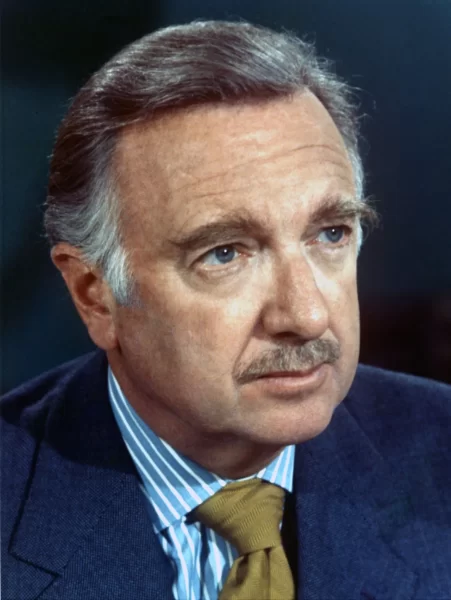Today is Part IV of our four-part series of articles that will look at The Business of News and Integrity in Journalism. Today’s focus brings everything together with an in-depth look at the Integrity of Journalism and how today’s business-first model has greatly affected not only how our news is delivered, but how many of us believe what we’re being told.
Google the name “Walter Cronkite” – go ahead, we’ll give you a few minutes to look over his online profile.
As you’ve certainly learned by now, he was the Lead Anchor for CBS Evening News for almost two decades. In that time he broke some of the biggest stories in our nation’s history up to that point from the assignation of JFK, riots and social unrest of the 1960s, civil rights leaders and other notable public figures being gunned down, the Nixon administration and all it’s scandals, the War in Vietnam – JUST TO NAME A FEW. You might also have noticed that his nickname was “The Most Trusted Man In America”. But why?
He didn’t have the answers he never dared to even come close to offering up solutions. He provided no commentary or insight into what the news of the day meant and his style was dry, direct, and no frills. And…that’s why he earned the name – he just went on the air every night and told you what happened, where it happened, when it happened, how it happened – but left out the why and what it meant going forward. And so, the American people never knew what his personal beliefs were, his politics, in fact – not much was publicly known about the man until many years after he signed off for the last time in the early 1980s. No one knew if he supported the War in Vietnam. You couldn’t tell if he was a Republican or a Democrat. He offered no commentary on what should be done about the hostage crisis of the 1970s, the gas shortages, what he felt about Roe vs. Wade – he just delivered the news. Plain and unfiltered. So how was he able to walk that very fine line, while others have failed miserably, and more importantly how did we get here? The answer starts with money. Below is a picture of Walter Cronkite

Corporate ownership of newspapers, television networks, and radio networks is nothing new. What is new is the expectation of what the news division of any of those companies contributed to the bottom line when it came to profitability. For the better part of the first thirty to forty years of television news, the news division was looked at as the “pride” of the company – not a cash cow, not a ratings winner – but the soul of the company. The objective was clear: report the news accurately, honestly, and with integrity to all parties involved. This meant no bombshell attempts at sabotage or headline-making – you were to report the news, not BE the news.
When a major story did come along, as we have outlined many famous examples in this series so far – the scrutiny of how reliable sources were, what the overall impact of moving on a story so huge that it could shake up governments, industry, health care or even world affairs – was intense! So if there is an area that can be pinpointed as where things start to go wrong with the overall integrity of news and journalism – where is it?
The explosion of news sources and delivery methods is most likely to blame. As we discussed in the first article in this series, the American people only used to get actual news two or three times a day – and from a VERY limited number of outlets. So when the competition started to heat up – and several major scandals led to a surge in media outlets reporting news, some 24/7, the expectations started to change. When the news could make a ton of money for parent companies such as Rupert Murdoch, Time Warner, GE, Paramount Global, or even Disney – the stakes got much higher and the focus began to shift from integrity and reliability first – to ratings and profitability first and foremost. This meant going live with “Breaking News” or pushing out major alerts that they often knew weren’t even close to being 100% accurate.
As we’ve done in other articles in this series, let’s take a look at just a few of the infamous examples of news outlets behaving badly for ratings, subscriptions, clicks and likes:
- Dan Rather, ironically enough Walter Cronkite’s successor on CBS Evening News, goes ahead with a story that then-President George W. Bush lied about his service record and used “newly surfaced” service records as proof of such a claim. Given that this was an election year the implication could severely hurt his chances of re-election. CBS later would be forced to acknowledge that the records were very possibly fabricated and likely not real at all. The stain on Rather’s career was huge and led to his “earlier than expected” retirement from the main desk.
- When Tom Brokaw announced his retirement, longtime NBC anchor Brian Williams was the perfect fit to take over the highly coveted role of lead anchor. He was very popular and would routinely make guest appearances on Leno & Letterman, and proved to be quite funny and a real storyteller. Too bad many of his more famous stories were greatly embellished or altogether untrue. Such was the case of a story he told on Letterman in 2013 about while reporting on the second Iraq War, his helicopter had been fired upon. As the scandal grew after one of the pilots from those helicopter runs confirmed that Williams was never on any of the flights that ever came close to enemy fire, many of William’s other wild stories began to unravel as well. After being placed on leave for six months, he was ultimately replaced by Lester Holt, also of NBC News. While it was never clear if he intended to make the already unpopular war seem more dangerous and out of control than it was, or if he was simply trying to make himself come across as one part newsman, one part Rambo – the integrity was greatly compromised.
- Adam Schefter, lead NFL insider at ESPN, gets a nurse in a Florida hospital to leak him Jason Pierre-Paul’s medical records to break the story that he blew half of his hand off in a freak fireworks accident over the 4th of July. This act was a blatant violation of Pierre-Paul’s HIPPA rights. Schefter faced no consequence from the Worldwide Leader for his actions and has since become one of the highest-paid on-air personalities on the network. The trend of breaking news when no real sports news exists continues to this day and has led many sports fans to look to other non-traditional sports outlets in hopes of getting a more accurate idea of what is going on.
- Buzzfeed reports that Special Counsel Robert Mueller has proof and witnesses willing to testify that Trump directed former personal attorney Michael Cohen to lie under oath to Congress. The story picks up major traction and gets leaders in the Democratic party to demand an immediate resignation or Articles of Impeachment. There in fact was no proof, or any witness including Cohen that could corroborate such an accusation. Such would be the beginning of a real war between the two political sides over highly questionable reporting, that often made major headlines – but wasn’t factual.
- Rupert Murdoch admits under oath that all of the main players at Fox News knew without a doubt that the “2020 Election Was Stollen” narrative was 100% false. When asked why the network and its top on-air talent continued to have election deniers furthering these false claims Murdoch responded “I could have stopped it, but I didn’t.” It is worth noting that Fox News has consistently ranked #1 in the cable news network war for ratings.

As in previous articles, we chose someone close to us all here at Woodmore – Mr. Fannin to speak with. He is not only a teacher, but the Advisor for the Journalism Program here.
Isabelle: “What made you want to take over the journalism program?”
Mr. Fannin: “It met a lot of the needs I had to teach people how to write. And to help people learn how to express themselves, it’s also the fact that people need honest, real journalism. And I look at a school newspaper like the one we had, and I saw some good stuff, but when I thought about what I would do differently, I see journalism as an opportunity to give a chance to people to say what they want and research and how to inform the community about things we could all benefit from knowing.
Isabelle: “How do you decipher between “good” or “bad” news?”
Mr. Fannin: “Evaluating a good reliable news source. It boils down to the writer’s motivation. Nowadays people become tricked by what they see and hear. One reason I think high school journalism has a good chance to be a good source for people, is young people are just barely learning how to put out news stories and the motivation to trick people is not what your thinking about, you want to inform people.
Isabelle: “Where do you get your news from?”
Mr. Fannin: “My favorite source is the long-form journalism from The Atlantic and “The Daily NY Times” Podcast. I will watch the evening ABC news when I’m home.”
Isabelle: “What is your vision for this journalism program?”
Mr. Fanin: “Honestly my vision is getting students who have their own vision and who support that vision. To test ideas and talk about how people need to be aware of what’s happening in the district. Also, I want the students to have fun with it. It doesn’t have to be serious stuff all of the time. The more practice, the more you do it and see how it comes out and could look.”
Isabelle: “How do you keep integrity in journalism while the news is changing all around us?”
Mr. Fannin: “More or less reliability and you want your sources to be accurate, objective as they can be and you want to avoid bias and maintain that integrity because your job is here to report the facts.”
Mr. Fannin has done an excellent job at working with all of us involved in journalism here to do the things he just talked about in this interview. At any level the news has to be informative, trustworthy, and sometimes – yes, a little bit fun. Why do you think most of the national evening newscasts always conclude with some type of “feel good” or “fun” piece? It’s because they spend the first 27 minutes of the telecast telling you everything awful going on in the world right now, and need to do something to make it not sting so much at the end…at least that’s our guess.
In honor of Brad Pitt’s 60th birthday (a Bush Girl Favorite), we thought we’d leave you with this speech by Anthony Hopkins in their movie “Meet Joe Black”. In this clip, Bill Parish is notifying his Board of Directors, why he is choosing to turn down a rival media mogul’s very generous offer to absorb his media empire (you can fast forward to 2:00 in the clip).
We live in a complicated world, and it seems to get a little crazier at each and every turn. But what this speech hits on better than any words of ours possibly can is this: reporting the news is a privilege. And just like Hopkins’s character says – to do it unvarnished. We can all do our part – stop getting our news in silos where we only hear, watch and read that which we already know we will agree on. Maybe then the next “Most Trusted Person in America” will emerge and bring us back to a place of integrity and responsibility in journalism and news. At least that’s our hope moving forward. Maybe it’s one of us!
Lucas Fanin is an English Teacher and Journalism Advisor at Woodmore High School. He has been with the district for three years. He lives in Perrysburg with his wife Beth, and his two children Aubrey and Emilia. He is a graduate of The University of Toledo. He enjoys playing golf, watching football, writing, and singing in his band.



























Michelle Amrein • Feb 22, 2024 at 8:42 am
Well done W2w! Shout out to Mr. Fannin! This is an excellent publication.